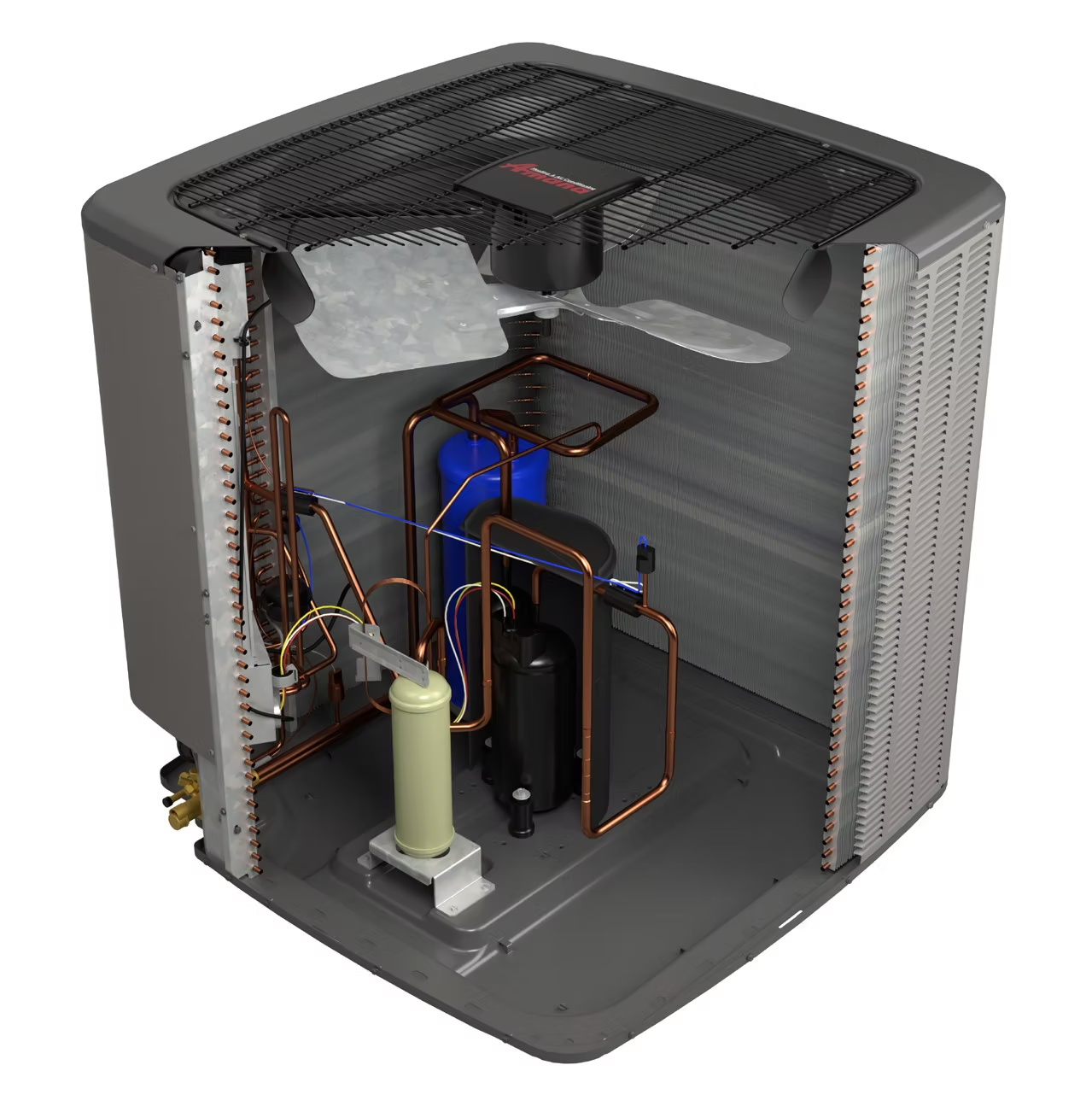Is an AC condenser & an AC compressor are the same thing? When it comes to understanding how your air conditioning system works, two crucial components often get mentioned: the AC compressor and the AC condenser. While these parts work together to cool your home, they perform distinct functions within the system. Knowing the difference between them can help you better understand your AC system and diagnose potential problems.
Image Credit: Amana Consumer Brochure
What is an AC Compressor?
The AC compressor is often referred to as the “heart” of your air conditioning system. Its primary role is to circulate refrigerant through the system, ensuring that the refrigerant moves between different components and keeps your home cool.
Here’s how the AC compressor works:
-
Compression of Refrigerant: The compressor takes in low-pressure, cool refrigerant gas from the evaporator inside your home. It then compresses this gas, raising its pressure and temperature.
-
Energy Transfer: Once the refrigerant is compressed, it is sent to the condenser, where the heat from your home is released to the outside.
-
Refrigerant Circulation: The compressor ensures the refrigerant circulates continuously, allowing the cooling process to keep repeating as long as the system is on.
Without the compressor, the refrigerant wouldn’t move through the system, and no cooling would take place.
What is an AC Condenser?
The AC condenser is a key component located outside your home, typically in the outdoor unit. Its primary job is to release the heat absorbed from your home to the outside air.
Here’s how the AC condenser works:
-
Condensing Refrigerant: After the refrigerant is compressed and heated in the compressor, it flows into the condenser as a hot gas. The condenser’s job is to cool the refrigerant by transferring the heat to the outside air.
-
Converting Gas to Liquid: As the refrigerant passes through the condenser coils, it cools down and changes from a gas back into a liquid. This liquid refrigerant is then sent back inside to the evaporator to absorb more heat from your home.
-
Heat Dissipation: The condenser uses a fan to blow air over the coils, which helps to remove the heat from the refrigerant and release it into the surrounding air outside.
Key Differences Between the Compressor and Condenser
-
Function:
-
The AC compressor compresses and circulates refrigerant, moving it through the system and raising its pressure and temperature.
-
The AC condenser removes heat from the refrigerant and cools it, allowing the refrigerant to continue the cooling cycle.
-
-
Location:
-
The compressor is part of the outdoor unit but is housed separately and is usually smaller.
-
The condenser is a larger component that also resides in the outdoor unit and includes condenser coils and a fan.
-
-
Process:
-
The compressor takes low-pressure refrigerant and turns it into a high-pressure gas.
-
The condenser turns the high-pressure gas into a liquid by removing heat from it.
-
How They Work Together
Both the AC compressor and the AC condenser are essential for cooling your home. The compressor pushes refrigerant through the system, and the condenser removes the heat from the refrigerant. If either part fails, your AC system won’t be able to cool your home efficiently, or at all.
Common Issues with Compressors and Condensers
-
Compressor Problems: The compressor can wear out over time due to mechanical issues or overheating. A malfunctioning compressor may cause your AC to blow warm air or stop working altogether.
-
Condenser Problems: The condenser can get clogged with dirt or debris, which makes it harder to release heat. Regular maintenance, such as cleaning the condenser coils, can help avoid these issues.
CONCLUSION
Understanding the difference between an AC compressor and an AC condenser is key to knowing how your air conditioning system works. The compressor compresses and moves refrigerant, while the condenser removes heat and cools the refrigerant. Both parts are essential to keeping your home comfortable, and regular maintenance can help prevent issues that could lead to costly repairs.
If you’re experiencing problems with your AC system, it’s important to contact a professional to diagnose whether the compressor, condenser, or another part of the system is causing the issue. At Graham Heating & Air Conditioning, we specialize in AC repair and maintenance to ensure your system runs smoothly all year long.
Need AC Repairs? Click below for HVAC service in your area:

